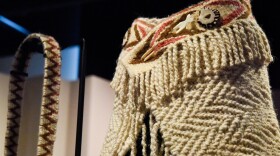The first time we see the African American Cultural Ensemble all together, they’re standing on brick steps, swaying gently, singing, each dressed in a different, bright color -- yellow, purple, pink, maroon and robin egg blue.
“Ooh, child, things are going to get easier. Ooh, child, things will get brighter.”
The line is from a 1970 hit by The Five Stairsteps called "O-o-h Child." And this scene is part of a video performance which marks the debut of the brand new gospel choir formed by Seattle’s Northwest African American Museum. The museum’s president and CEO, LaNesha DeBardelaben, says it’s the first ensemble of its kind formed by an African American history museum anywhere.
“When we go into museums we typically find ourselves reading text on a wall, and we find ourselves looking at images,” DeBardelaben said. But she says this ensemble will allow the museum to reach the public in a different way.
“It comes to life in ways that really stick with people beyond reading something on a wall,” she said. “That song is in their head after they hear it, after it’s turned off. They’re able to take the museum experience with them in a really unique way.”
The finished video will be shown at 6 p.m. Tuesday, June 15, during Juneteenth celebrations in collaboration with nine other museums of African American history and culture around the country.
Forming a choir
The scene of the choir singing was filmed on the steps of St. Therese Parish, long a home for gospel music in Seattle’s Madrona neighborhood.
Kenya Leger sings tenor in the ensemble and is a member of St. Therese. In the raw footage of the video shoot, you can hear laughter and cheers from a nearby playground as the choir sings in the sunshine. Off camera, people were stopping to watch.
“We really were just having a lot of fun and joking around,” Leger said. “A number of us have known each other through the years in different other groups.”
Those networks of contacts were key in getting the group together quickly. Invitations to join the group went out in March. Leger heard about the group from its director, Jason Turner, and then told his friend Tommie Burton about it.
“Everything he said about the aims of the choir is everything that I’m passionate about,” said Burton, who sings tenor.
Gospel music, he said, is “joy in the face of discrimination, redlining, Jim Crow segregation, and the overall process of African Americans truly realizing their citizenship and their agency within our country.
“Being Black in the Pacific Northwest, oftentimes that means living in marginalization, not seeing each other,” Burton said. “I think African Americans value those moments when we can be together, when we can be in cultural step with each other. I felt that. I think most African Americans cherish that. It was a great moment to be together in song, with each other.”
For DeBardelaben, who founded the ensemble, seeing the choir's debut performance is, itself, a moment of great joy.
“I am so proud at this moment,” she said. “I am proud of the fact that our ancestors will have their stories told and re-told, through the music and the melodies of the African American Cultural Ensemble. We are bringing negro spirituals to the 21st century. We are bringing freedom songs, and songs from the freedom movement and the Civil Rights movement into the 21st century. We are bringing the stories and the experiences of African American heritage, through song, to the people to create a better, stronger, more equitable future.”
The message in the song
Director Jason Turner, who is also the museum’s educator and tour guide, said he was looking for a song that would inspire hope and get people thinking about a better tomorrow, especially after this last year.
“I don’t know what’s going on in this country, but it’s really polarized, and on top of that, there’s COVID,” he said.
And “O-o-h Child,” from 51 years ago, carries messages that are still relevant today.
“There was still a lot of police brutality happening in the '70s,” Turner said. “If you look at the lyrics, it’s ‘We’ll get it together, we’ll get it all done, when the world is much lighter, and when the world is much brighter.’ ”
He says there’s a parallel message in Juneteenth, which commemorates the day in 1865 that enslaved people in Texas finally learned they were free, years after the Emancipation Proclamation took effect, and months after the end of the Civil War.
“If you look at the enslaved Africans who didn’t get the message that they were free for two or three years, or sometimes even longer, when they found out, they were joyous,” he said. “It (was) a little late, but (they said), ‘We’re still going to celebrate. We’re still going to be hopeful for the future. We certainly hope that this means change.’ ”
The song brings hope, Turner said, with his favorite part right at the end.
“Because (the lyrics are) ‘Oh, child, things are gonna get better, things are gonna get easier,’ ” he said. “But when?”
The choir answers: “Right now. Right now. Right now.”







